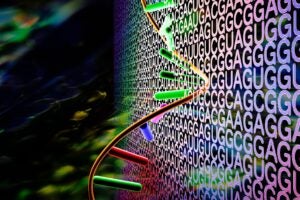AUSTIN, Texas, and PRINCETON, N.J. — The University of Texas at Austin and Bristol-Myers Squibb Co. today announced a joint research collaboration to discover and develop telomerase inhibitors that may be novel anticancer compounds.
Telomerase is an enzyme that is overproduced in cancer cells and plays a pivotal role in their immortality. Blocking the activity of this enzyme may prohibit the growth and spread of human tumors.
Inhibition of the telomerase enzyme is a new avenue to cancer therapy research. “Cancer cells use telomerase to maintain the protective ends of their chromosomes,” said Dr. Laurence Hurley, George Hitchings Regents Chair in Drug Design at UT Austin, “which are critical for the survival of the cells. If we can inhibit telomerase, we will disrupt the cancer cell¡s chromosome ends and slow tumor growth.””Drug targeting of the special structures at the ends of chromosomes represents an exciting opportunity in cancer treatment,” said Dr. William Koster, senior vice president, Drug Discovery, Bristol-Myers Squibb Pharmaceutical Research Institute. “Dr. Hurley’s team has considerable experience in designing drugs that target DNA, and based on this experience, I believe we can design potential drugs that would selectively find, and then inactivate, the ends of cancer cell chromosomes through inhibition of telomerase. We believe that this represents a potentially exciting new approach for the treatment of patients with cancer.”
According to the terms of the agreement, Bristol-Myers Squibb will fund a three-year research collaboration and provide scheduled payments to UT Austin for successfully meeting designated research goals. In return, Bristol-Myers Squibb will be granted exclusive worldwide rights to any lead compounds in development or discovered during the collaboration. UT will receive royalty payments from any marketed products.
UT’s Office of Technology Licensing and Office of Sponsored Projects were instrumental in negotiations for the collaboration between Bristol-Myers Squibb and the University.
The research program that led to this new collaboration is an outgrowth of a preexisting collaboration between UT Austin and the Institute for Drug Development (IDD) in San Antonio. Dr. Daniel Von Hoff, director of IDD, said, “Drug targeting of telomerase is a unique approach to take advantage of a real difference between tumor and normal cells.”
Hurley heads up the oncology drug design laboratory in the Drug Dynamics Institute in the College of Pharmacy at UT Austin. He is the recipient of an Outstanding Investigator Award from the National Cancer Institute and is internationally recognized for his research in the development of novel approaches to the design of drugs for the treatment of cancer. His previous research collaborations have led to drugs that are presently being tested in the clinic.
Bristol-Myers Squibb is a diversified worldwide health and personal care company whose principal businesses are pharmaceuticals, consumer products, nutritionals and medical devices. It is a leading maker of innovative therapies for cardiovascular, metabolic and infectious diseases, central nervous system and dermatological disorders and cancers. The company is a leader in consumer medicines, orthopaedic devices, ostomy care, wound management, nutritional supplements, infant formulas and hair and skin care products.
NOTE TO EDITORS: Photos of Dr. Hurley and a model showing the telomeric structure are available through the Associated Press or via the UT Office of Public Affairs FTP site: Find fetch; Open: new connection; Host: opa7.wwh.utexas.edu; User ID: photography; Password: fixer; Directory: (do not change this field. Press ok).



